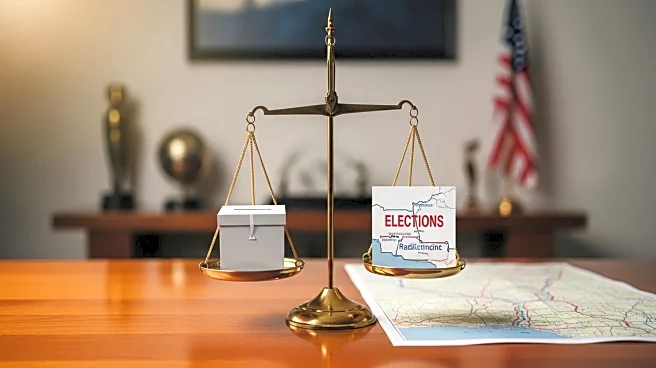What is the story about?
What's Happening?
A bipartisan effort led by Ray LaHood and Bill Daley aims to address gerrymandering in Illinois state elections through a constitutional amendment. The proposal seeks to establish a bipartisan commission to draw state legislative maps, replacing the current system where the party in power controls mapmaking. The initiative, known as Fair Maps Illinois, requires gathering 400,000 signatures to place the amendment on the ballot for the November 2026 election. The plan includes safeguards against partisan manipulation and aims to create fairer, more competitive electoral districts.
Why It's Important?
The proposed amendment is significant as it addresses the longstanding issue of gerrymandering, which has led to uncontested races and diminished voter influence in Illinois. By creating a bipartisan commission, the plan seeks to ensure fair representation and reduce political extremism. If successful, the amendment could lead to a more balanced and accountable government, encouraging voter participation and potentially reversing the trend of political disenfranchisement. The initiative reflects a broader national conversation on electoral reform and the need for transparent and equitable political processes.
What's Next?
The success of the Fair Maps Illinois initiative depends on gathering sufficient support and overcoming potential legal challenges. If placed on the ballot, the amendment will require either a three-fifths majority vote or a simple majority of all voters in the election to pass. The campaign will need to persuade Illinoisans of the benefits of redistricting reform, emphasizing the potential for more competitive elections and better representation. The outcome of this effort could set a precedent for other states grappling with similar issues, influencing national discussions on electoral integrity.
Beyond the Headlines
The proposal highlights the ethical and democratic implications of gerrymandering, emphasizing the need for systems that prioritize voter choice over political advantage. The involvement of figures like LaHood and Daley, who represent moderate wings of their parties, underscores the potential for bipartisan cooperation in addressing systemic political issues. The initiative also reflects broader societal concerns about the health of democracy and the importance of ensuring that electoral processes are fair and representative.
















